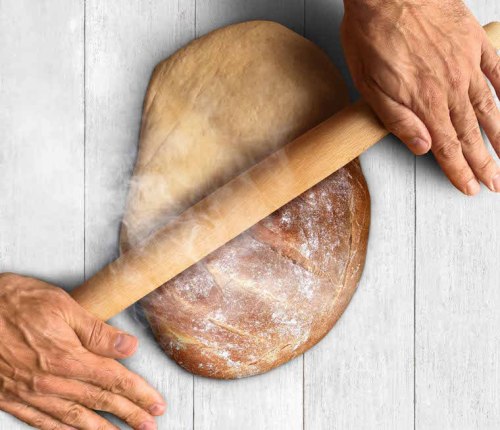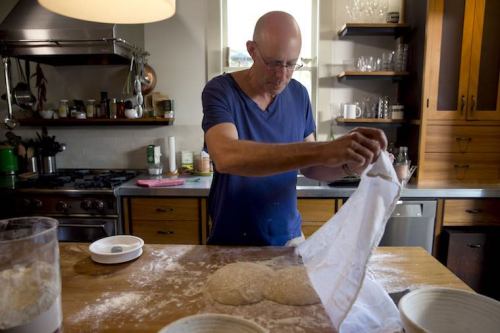Our editors independently select these products. Making a purchase through our links may earn Well+Good a commission
Michael Pollan believes you should be eating more gluten (of a certain type)
The Cooked author thinks fermented sourdough bread is good for gut health, and that many people who believe they need to eat gluten-free don't have to.

Best-selling author Michael Pollan has opened our collective eyes to the horrors of industrial agriculture and encouraged us to eat mostly plants. And now he’s championing…gluten?
In Pollan’s latest project, a four-part Netflix series based on his 2013 hit book Cooked, the celebrated writer defends the food that many of us are working hard to avoid (by replacing it with, say, cauliflower in a grilled cheese, or by making pasta out of chickpeas, quinoa, or lentils).
Cooked is a total must-watch, bubbling over with culinary intel, a lot of which is pretty radical. Pollan argues, for example, that eating a small amount of meat from local sources with responsible farming practices is good for the environment, because it encourages sustainable agriculture.
But the biggest surprise in Cooked, wellness-wise, is Pollan’s adamant belief that bread doesn’t deserve its bad rap (at least, not all bread). We caught up with him to learn why.
A thoroughly modern crisis
Pollan’s not a gluten denier. He knows that Celiac disease is a debilitating autoimmune disorder, and that gluten intolerances can take a huge toll. But he doesn’t believe the issue is as widespread as the thriving gluten-free food industry would have everyone believe.
“Gluten is bad for some people, but I think a much smaller number than we think,” he says. “There are people that have a genuine gluten intolerance, and then I think [there are] a lot of people who think they do.” The answer for those folks, Pollan believes, is fermentation: “If they ate bread that’s undergone a long sourdough fermentation, they wouldn’t have any problems.”

Bread’s forgotten roots
For centuries, bread makers made fermented sourdough bread, a slow process that begins with a natural starter of water and flour, which are left to sit together so fermentation can work its magic. Yeast from the air (no need to add in a packet of the stuff) reacts with the flour, feeding on the starches and multiplying slowly. Eventually, gut-healthy lactobacillus bacteria grow.
“[The] tradition of fermenting flour with sourdough breaks down the peptides in gluten that give people trouble,” Pollan says. Commercial bread companies cut corners to speed up the bread-making process, and that is where issues arise, he says: “Anecdotally, I’ve heard from lots of people that when they eat properly fermented bread, they can tolerate it.”
Finding fermented bread
Pollan acknowledges that it can seem downright impossible to find the time to properly bake fermented bread, a process that takes days. One way to go about it is to find a trusted local baker, like Richard Bourdon, from Berkshire Mountain Bakery in Massachusetts, whom Pollan features in the series and who understands topics like oxidation as well as a scientist.
But Pollan’s overall thesis in Cooked is that cooking isn’t simply a worthwhile investment in your health; it’s a broader declaration to the world that big food corporations don’t get to control how you eat.
Baking (or buying) good quality fermented bread, in other words, might just be one of the most radical things you can do. —Kristy Mucci
Craving more gut-friendly eats? This breakfast is awesome. Or try these must-have fermented foods. Just make sure you don’t reach for anything with Frankenwheat.
Sign Up for Our Daily Newsletter
Get all the latest in wellness, trends, food, fitness, beauty, and more delivered right to your inbox.
Got it, you've been added to our email list.










